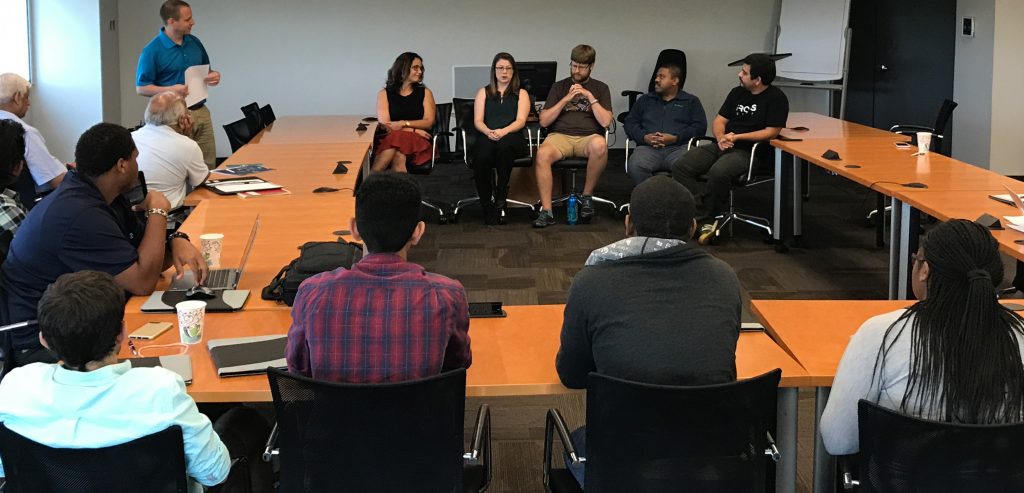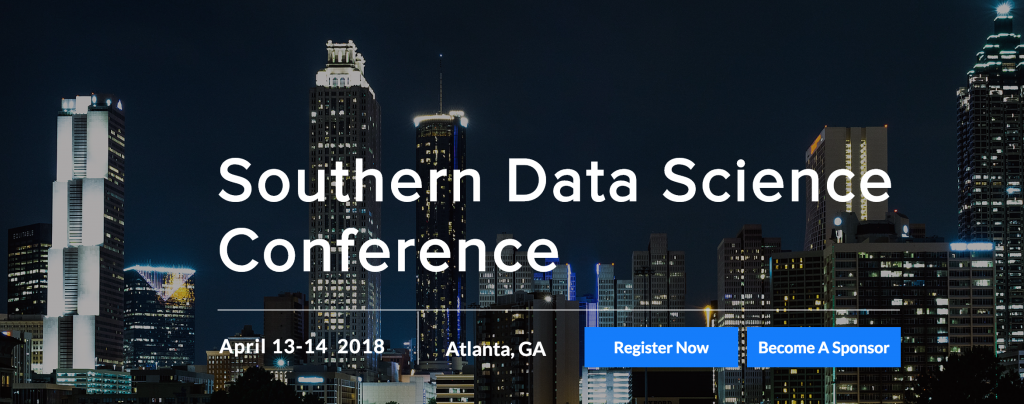 The 2018 Southern Data Science Conference (SDSC 18) will bring experts and researchers from top companies and research institutes to Atlanta on April 13 and 14 for two days of sharing best practices and discussing the latest issues, challenges, and trends in data science. Read more…
The 2018 Southern Data Science Conference (SDSC 18) will bring experts and researchers from top companies and research institutes to Atlanta on April 13 and 14 for two days of sharing best practices and discussing the latest issues, challenges, and trends in data science. Read more…
South Big Data Hub, NCDS help sponsor Southern Data Science Conference; registration now open
RENCI makes an impact at fall AGU meeting
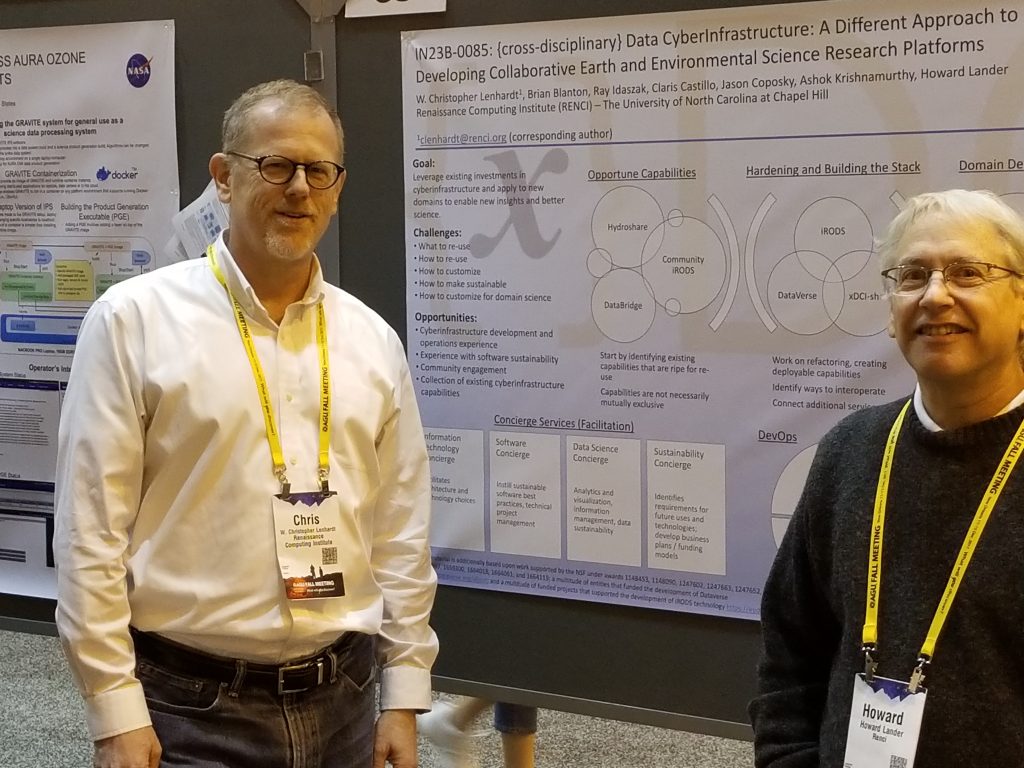
Chris Lenhardt (left), and Howard Lander with their poster at the AGU fall meeting.
Why was New Orleans inundated with scientists during the week of December 11 – 15? They were in the Big Easy for the fall meeting of the American Geophysical Union (AGU), a conference that attracts about 24,000 Earth and geoscientists from across the nation and around the globe. Read more…
RENCI’s Claris Castillo strengthens her leadership muscles through BRIDGES
Claris Castillo, a senior computational and networked systems researcher at RENCI, recently completed the BRIDGES program that promotes academic leadership among women. The four-week program targets women in higher education institutions seeking to strengthen their academic leadership skills and advance their careers in academia. Read more…
Educators offer tips on making sense of the data revolution
“We are creating every 10 minutes what we were creating every 2,000 years, and that’s the problem.”
This statement, by panelist Arcot Rajasekar, succinctly sums up one of the many challenges stemming from the modern big data environment discussed at “A Citizen’s Guide to Big Data.” Read more…
RENCI scientist set to join the ranks of Climate Reality Leaders
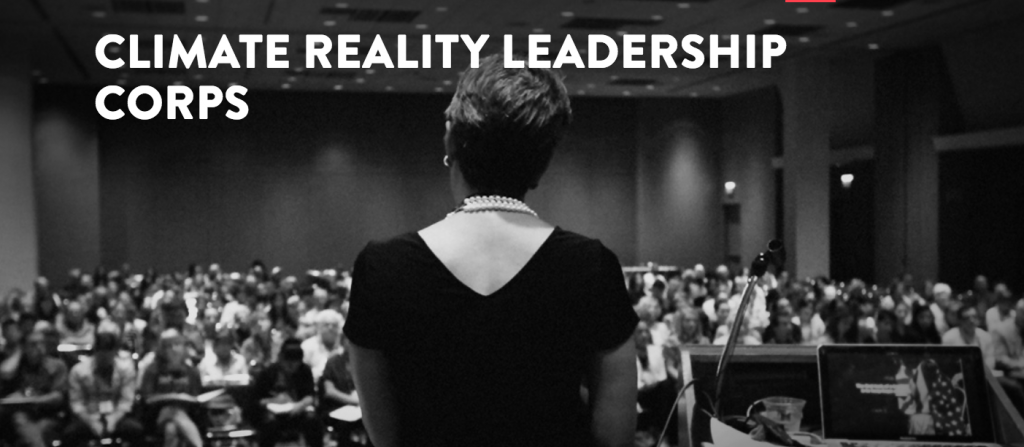 As the Climate Reality Project website says: Ordinary people face challenges. Climate Reality Leaders embrace them.
As the Climate Reality Project website says: Ordinary people face challenges. Climate Reality Leaders embrace them.
RENCI’s Chris Lenhardt, an environmental data science and systems expert, will join the ranks of these leaders when he attends three days of training Oct. 17 – 19 to become part of the Climate Reality Leadership Corps. The Leadership Corps is a global network of individuals committed to tackling the climate crisis and solving what is far and away the greatest challenge of our time. The Leadership Corps is part of the Climate Reality Project launched by former Vice President Al Gore to increase awareness about climate change and to support efforts at all levels aimed at reducing carbon emissions. Read more…
Data Fellows project aims to make storm surge predictions faster and more accurate
By Nelson Tull
Note: Nelson Tull is a graduate student in the Department of Civil, Construction, and Environmental Engineering at North Carolina State University. His faculty advisor, Casey Dietrich, is an NCDS Data Fellow conducting research to improve hurricane and storm surge guidance to emergency managers in North Carolina’s coastal counties. Dietrich’s Data Fellows research builds on previous work supported by the North Carolina Sea Grant program. Other collaborators are Rick Luettich, head of the Institute of Marine Sciences at UNC-Chapel Hill, Brian Blanton, a senior research scientist and oceanographer at RENCI, and Jason Fleming of Seahorse Coastal Consulting. To learn more about this research, tune into the September 2017 NCDS DataBytes webinar.
When lives are on the line, minutes count but so does accuracy
Storm surge model forecasts are a critical tool used by coastal emergency managers to plan and make decisions. These models must be both accurate and fast to give reliable information in a timely manner as a storm moves toward the coast. The forecast guidance must also be visualized in a way that is meaningful to those who need this vital information. Read more…
NSF-funded undergraduate researchers get a taste of life at RENCI
On July 21, RENCI hosted 11 students and two professors from the National Science Foundation’s Research Experience for Undergraduates (REU) program. The program allows undergraduates to actively participate in research in any of the areas of research funded by the NSF. REU projects involve students in meaningful ways in ongoing research programs or in research projects specifically designed for the REU program. As a part of their REU experience at North Carolina A & T State University, a group of undergraduate students from diverse backgrounds and several universities came to RENCI for an educational tour. Read more…
SAA award winning book has RENCI, UNC connections
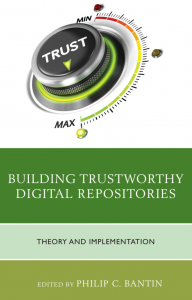 The Waldo Gifford Leland Award is presented annually by the Society of American Archivists (SAA) to an author or authors in recognition of “writing of superior excellence and usefulness in the field of archival history, theory, or practice.”
The Waldo Gifford Leland Award is presented annually by the Society of American Archivists (SAA) to an author or authors in recognition of “writing of superior excellence and usefulness in the field of archival history, theory, or practice.”
It’s an achievement worth bragging about, and this year, bragging rights belong to Philip C. Bantin, director of the archives and records management specialization at Indiana University, as well as to multiple chapter authors, including a team from RENCI, UNC-Chapel Hill and Harvard University. Read more…
25th GENI Conference looks towards the future of advanced networking
The 25th GENI Engineering Conference hosted by Florida International University in March provided an excellent forum for over 100 participants from industry, academia and government to come together and discuss a variety of issues relevant to testbeds for at-scale experimentation in networking and distributed systems. Topics discussed included:
- Interoperability between GENI and other U.S. and international infrastructures;
- Enhancements and new directions for the GENI infrastructure in order to support future needs of the networking, distributed systems, and cloud computing communities and to attract research from other communities;
- Research and education activities currently underway on GENI; and
- GENI transition activities that are underway.
Fourth annual Data Matters™ Short Court Series offers a wide range of topics for 2017
 Calling all researchers who manage, share, analyze and archive large or complicated data sets, business professionals struggling to stay afloat in the data deluge, data analysts looking to sharpen their skills, and students interested in the hot field of data science. The five-day Data Matters Short Course series is here to help and give you the knowledge you need to thrive in our data rich world.
Calling all researchers who manage, share, analyze and archive large or complicated data sets, business professionals struggling to stay afloat in the data deluge, data analysts looking to sharpen their skills, and students interested in the hot field of data science. The five-day Data Matters Short Course series is here to help and give you the knowledge you need to thrive in our data rich world.


